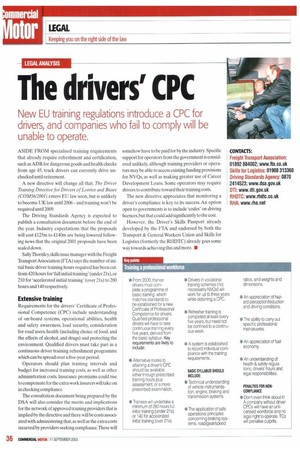The drivers' CPC
Page 36

If you've noticed an error in this article please click here to report it so we can fix it.
New EU training regulations introduce a CPC for drivers, and companies who fail to comply will be unable to operate.
ASIDE FROM specialised training requirements that already require refreshment and certification, such as ADR for dangerous goods and health checks from age 45. truck drivers can currently drive unchecked until retirement.
A new directive will change all that. The Driver Training Directive for Drivers of Lorries and Buses (C0M56/2001) enters EU law soon, but is unlikely to become UK law until 2006— and training won't be required until 2009.
The Driving Standards Agency is expected to publish a consultation document before the end of the year. Industry expectations that the proposals will cost £125m to £140m are being lowered following news that the original 2001 proposals have been scaled down.
Sally Thomley,skills issue manager with the Freight Transport Association (FTA) says the number of initial basic driver training hours required has been cut. from 420 hours for 'full initial training' (under 21s), or 210 for `accelerated initial training' (over 21s) to 280 hours and 140 respectively.
Extensive training
Requirements for the drivers' Certificate of Professional Competence (CPC) include understanding of on-board systems, operational abilities, health and safety awareness, load security, consideration for road users, health (including choice of food, and the effects of alcohol, and drugs) and protecting the environment. Qualified drivers must take part in a continuous driver training refreshment programme which can be spread over a five-year period.
Operators should plan training intervals and budget for increased training costs, as well as other administration costs. Insurance premiums could rise to compensate for the extra work insurers will take on in checking compliance.
The consultation document being prepared by the DSA will also consider the merits and implications for the network of approved training providers that is implied by the directive and there will be costs associated with administering that, as well as the extra costs incurred by providers seeking compliance. These will somehow have to be paid for by the industry. Specific support for operators from the government is considered unlikely, although training providers or operators may be able to access existing funding provisions for NVQs, as well as making greater use of Career Development Loans. Some operators may require drivers to contribute toward their training costs.
The new directive appreciates that monitoring a driver's compliance is key to its success. An option open to governments is to include 'codes' on driving licences, but that could add significantly to the cost.
However, the Driver's Skills Passport already developed by the PTA and endorsed by both the Transport & General Workers Union and Skills for Logistics (formerly the RHDTC) already goes some way towards achieving this and more. •








































































































































































































